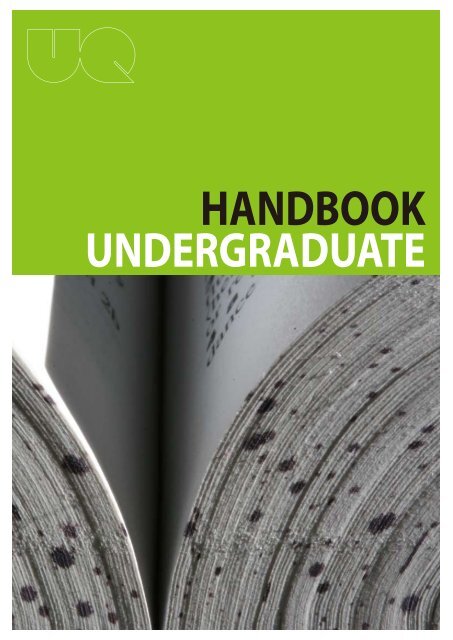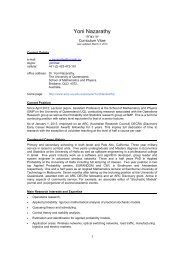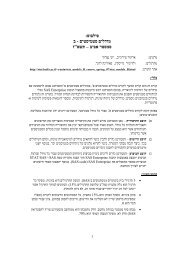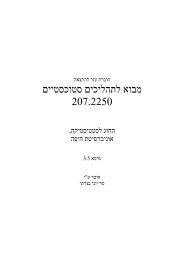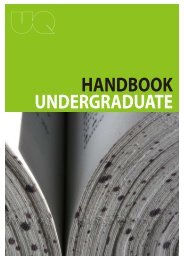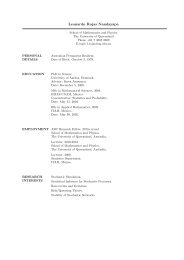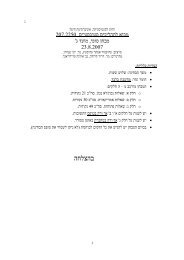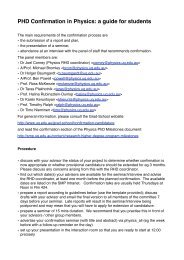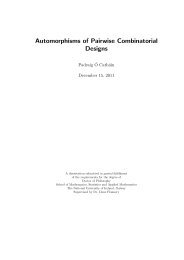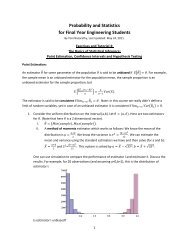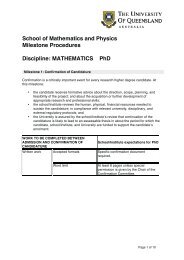Information for Students - School of Mathematics and Physics ...
Information for Students - School of Mathematics and Physics ...
Information for Students - School of Mathematics and Physics ...
Create successful ePaper yourself
Turn your PDF publications into a flip-book with our unique Google optimized e-Paper software.
<strong>In<strong>for</strong>mation</strong> <strong>for</strong> <strong>Students</strong>MySI-Net<strong>Students</strong> enrol via the web, <strong>and</strong> are able to check their enrolment <strong>and</strong> personal details using mySInet,which is accessed from the Current <strong>Students</strong> tab on the UQ home page www.uq.edu.au, thenfollow the mySI-net link.MySI-net enables you to:• • enrol in your chosen courses;• • cancel a course <strong>and</strong>/or add a different course;• • check your enrolment details;INFORMATION FOR STUDENTS• • change your personal details, your address <strong>and</strong> phone number;• • view course descriptions, class timetable <strong>and</strong> exam timetable;• • register electronically <strong>for</strong> classes which require “sign-on”;• • submit your HECS-HELP <strong>for</strong>m <strong>for</strong> your program.MySI-net also gives you key dates related to your study each semester. You should check mySI-netregularly <strong>for</strong> updated in<strong>for</strong>mation. You should also ensure that you keep your contact details (suchas mailing address) up-to-date. The Enrolment Guide on the mySI-net Home Page is designed toassist new students to get started at UQ.TimetableLorem IpsumUsing the TimetableYou can look at the timetable <strong>for</strong> a123particularEverywherecourseAvenueon MySI-net. Click on the link <strong>for</strong> the Timetablein the semester concerned <strong>and</strong> then enterCity,theStcourse00000code (e.g. MATH1050). This will give youthe day, time <strong>and</strong> venue <strong>for</strong> each <strong>of</strong> the classes in a given course. You should check mySI-netregularly; just be<strong>for</strong>e the beginning <strong>of</strong> semester <strong>and</strong> <strong>for</strong> a few weeks into the new semester to checkwhether there has been any change <strong>of</strong> venue <strong>for</strong> your class.Symbols ExplainedSymbols are used in the timetable to indicate the type <strong>of</strong> class contact. After the eight-digit coursecode, e.g. PHYS1001, a number <strong>of</strong> other letters <strong>and</strong> numbers usually appear. These indicate theclass contact type. The first symbol denotes the kind <strong>of</strong> contact:C = General Contact, perhaps a group learning situation.L = Lecture, usually in an auditorium or theatre, <strong>of</strong> core course matter.P = Practical, consisting <strong>of</strong> laboratory workT = Tutorial, a small class environment characterised by discussion <strong>and</strong> peer interaction, <strong>of</strong>tensupplementary to lectures.If there is more than one lecture each week <strong>for</strong> the course <strong>and</strong> you are expected to attend each one,the classes will be shown in the style L. There is new material in each class.If the enrolment in a course is larger than one lecture theatre can hold, there is a choice <strong>of</strong> lecturestreams <strong>and</strong> you are required to attend all the lectures each week in a stream. These lectures willbe labelled L1, L1, L1, L2, L2, L2. You choose group 1 or 2 <strong>and</strong> attend each lecture in that stream.You may be required to sign on electronically to the stream <strong>of</strong> lectures you’ve chosen to attend.Practical <strong>and</strong> tutorial classes are labelled (T1, T2, <strong>and</strong> T3 etc). This means you must choose oneclass to attend at one <strong>of</strong> the times given.Check the 2010 Enrolment Guide on mySI-net <strong>for</strong> more in<strong>for</strong>mation.Page 8
Assistance <strong>for</strong> <strong>Students</strong><strong>Students</strong> with English language difficulties who require development <strong>of</strong> their English skills shouldcontact the Institute <strong>for</strong> Continuing <strong>and</strong> TESOL Education. Phone +61 (0) 7 3346 6770.The Learning Assistance Unit is located in the Relaxation Block in Student Services in the UnionComplex. You may consult learning advisors in the unit to provide assistance with study skills,writing assignments <strong>and</strong> the like. Individual sessions are available. Student Services also <strong>of</strong>fersworkshops to assist students. For more in<strong>for</strong>mation phone +61 (0) 7 3365 1704 or visit http://www.uq.edu.au/student-services/index.html?page=1181.<strong>Students</strong> with DisabilitiesAny student with a disability who may require alternative academic arrangements in any course<strong>of</strong>fered by this <strong>School</strong> is encouraged to seek advice at the commencement <strong>of</strong> the semester froma Disability Adviser at Student Services. <strong>In<strong>for</strong>mation</strong> about the Disability Program can be found athttp://www.uq.edu.au/student-services/index.html?page=1208Student ServicesThe website <strong>for</strong> Student Services is http://www.uq.edu.au/student-services.The following services are <strong>of</strong>fered on a free <strong>and</strong> confidential basis:• • career planning;• • employment in<strong>for</strong>mation;• • resume writing/interview skills;INFORMATION FOR STUDENTS• • learning assistance;• • study skills courses;• • personal counselling;• • accommodation assistance;• • international student support.Student CentreThe Student Centre is located on the Ground Level <strong>of</strong> the JD Story Building (near the bus stop).For contact details <strong>and</strong> opening hours, see www.uq.edu.au/student-centre. You are able to obtainin<strong>for</strong>mation at the Centre on:• • enrolments;• • general course in<strong>for</strong>mation;• • fees <strong>and</strong> HECS-HELP <strong>and</strong> FEE-HELP;• • academic records;• • examinations;• • exclusions;• • prizes <strong>and</strong> scholarships;• • graduations;• • traffic <strong>and</strong> parking;• • lodgement <strong>of</strong> <strong>for</strong>ms.Page 9
Outreach ProgramThe <strong>School</strong> <strong>of</strong> <strong>Mathematics</strong> <strong>and</strong> <strong>Physics</strong> undertake a range <strong>of</strong> activities that contribute to the widercommunity. We believe that mathematics <strong>and</strong> physics are fundemental tools that people use todiscover, learn <strong>and</strong> make an active contribution to society with... <strong>and</strong> we’re not talking about havingeveryone become a quantum physics expert. Being a scientist isn’t <strong>for</strong> everyone but science is!Science is a huge part <strong>of</strong> our daily lives, even if we don’t acknowledge it, such as the computer youare currently using, our transport, your mobile phone, mp3 player, the materials your house is made<strong>of</strong>, the list goes on.The <strong>School</strong> <strong>of</strong>fers a range <strong>of</strong> activities <strong>and</strong> events <strong>for</strong> you to attend or become an active sciencecommunicator by joining. Visit www.smp.uq.edu.au <strong>for</strong> more in<strong>for</strong>mation about our programs.Programs include:• UQ Demo TroupeINFORMATION FOR STUDENTS• BrisScience lecture series• <strong>Physics</strong> Museum• Maths <strong>and</strong> <strong>Physics</strong> tours• <strong>School</strong> visits• Tools <strong>of</strong> ScienceIf you would like to contibute to the <strong>School</strong>s outreach program please contact the <strong>School</strong>’s sciencecommunicator, Andrew Stephenson (a.stephenson@uq.edu.au).Page 10
Examination TimetablesThe Examination Timetable is published about 4 weeks prior to the end <strong>of</strong> semester examinationperiod. The timetable can be viewed via mySI-net <strong>and</strong> myAdvisor from the University Web Page. Itwill also be placed on noticeboards in each discipline within the <strong>School</strong>. Please read the timetablecarefully so you do not miss your exams as special examinations are not granted on the grounds <strong>of</strong>misreading the examination timetable.Student ID <strong>for</strong> examinationsYou must bring your student ID to examinations <strong>and</strong> it must be displayed throughout the exam. Ifyou do not have your UQ student ID card with you, you will be refused entry into the examinationroom. You will be directed to the Student Centre to obtain documentation certifying youridentification <strong>and</strong> permitting entry to the exam room. Extra exam time will not be given in caseswhere students do not have a current UQ student ID card readily available.KEY DATESThe use <strong>of</strong> calculators in examinationsThe following guidelines are in place to ensure students with advanced calculators cannot obtain anunfair advantage in examinations:• except <strong>for</strong> examinations to which students are permitted to bring textual materials(calculators with advanced text storage capability are not permitted);• examination supervisors are asked to identify calculators with advanced text storagecapability by their having a “QWERTY” keypad, <strong>and</strong> ban their use when necessary;• examiners provide clear instructions on examination papers stating that calculators withtext storage capability are not permitted.You will be advised if you are required to have an “Approved Calculator” label affixed to yourcalculator. Labels are obtained from the Faculty <strong>of</strong> Engineering, Architecture <strong>and</strong> <strong>In<strong>for</strong>mation</strong>Technology (EAIT). <strong>In<strong>for</strong>mation</strong> about approved calculators <strong>and</strong> calculator labels can be found athttp://student.eait.uq.edu.au/calculators.Special Arrangements• If you require special arrangements to enable you to sit your examination or specialconditions so you can per<strong>for</strong>m at your best during an examination, certain arrangementscan be made.• Under the University’s General Award Rules, no arrangements will be made less than 14days be<strong>for</strong>e the commencement <strong>of</strong> the relevant examination period. You will find a linkto the General Award Rules on the University rules page. Check the online in<strong>for</strong>mationwww.uq.edu.au/myadvisor/special-arrangements <strong>for</strong> more in<strong>for</strong>mation.Applying <strong>for</strong> a Special ExaminationIf you are prevented from attending a scheduled examination, you must submit an application <strong>for</strong> aspecial examination in accordance with the General Award Rules (contained on myAdvisor website).Applications <strong>for</strong> special exams must be made to the Student Centre.Applications <strong>for</strong> special examinations must be made on the appropriate <strong>for</strong>m (available from theStudent Centre or downloaded from the web from myAdvisor www.uq.edu.au/myadvisor/<strong>for</strong>ms/exams/SpecAppForm.pdf ) within 5 days <strong>of</strong> the date <strong>of</strong> the examination.Late applications will not be considered. If a special examination is awarded, a system-generatedemail will advise you that the SP exam has been granted. You must check on mySI-net <strong>and</strong>myAdvisor <strong>for</strong> specific details <strong>of</strong> time <strong>and</strong> place <strong>for</strong> the special examination(s). For school exams,the course coordinator will advise <strong>of</strong> the time <strong>and</strong> place <strong>for</strong> the special examinationPage 12
If you are not satisfied with your result in a course <strong>and</strong> have obtained feedback from your lecturer,you may make a <strong>for</strong>mal request <strong>for</strong> assessment re-marking. The <strong>for</strong>m is found at www.uq.edu.au/hupp/attachments/teaching-learning/Request<strong>for</strong>AssessmentRe-marking<strong>for</strong>m.pdf. Requests <strong>for</strong> remark<strong>of</strong> assessment must be made within six months <strong>of</strong> the <strong>of</strong>ficial release <strong>of</strong> results <strong>for</strong> a course.Grievance ProceduresThe University’s policy <strong>for</strong> the resolution <strong>of</strong> student grievances may be found on the web at www.uq.edu.au/hupp/index.html?page=25126.For an academic grievance you may appeal <strong>for</strong>mally to the Head <strong>of</strong> <strong>School</strong>, the Executive Dean <strong>and</strong>finally the Senate Student Appeals Committee.PlagiarismPlagiarism involves the use <strong>of</strong> other peoples’ ideas <strong>and</strong> works without acknowledging the source <strong>of</strong>the in<strong>for</strong>mation.To avoid plagiarism, you must give credit whenever you:• quote from a person’s actual spoken or written words;• use another person’s ideas, opinions or theories in an assignment etc.;• paraphrase another person’s spoken or written word.To avoid unintentional plagiarism you can:• use quotation marks around everything that comes directly from a text or article;• summarise ideas <strong>and</strong> arguments in your own words;• check that you have correctly paraphrased the original ideas;• check your summary against the original text.KEY DATESFor the full policy on academic integrity <strong>and</strong> plagiarism, please refer to the University <strong>of</strong>Queensl<strong>and</strong>’s H<strong>and</strong>book <strong>of</strong> University Policies & Procedures (HUPP) at www.uq.edu.au/hupp/index.html?page=25128&pid=25075<strong>Students</strong> who submit material which has been plagiarised may be subject to a <strong>for</strong>mal misconducthearing.Page 14
Undergraduate DegreesThe majority <strong>of</strong> students in our <strong>School</strong> are doing the Bachelor <strong>of</strong> Science degree which normallyrequires three years <strong>of</strong> full-time study during which students may specialise in one or more majorsin <strong>Physics</strong>, <strong>Mathematics</strong> or Statistics <strong>and</strong> extended majors in Biophysics or Computational Science.To gain a Bachelor <strong>of</strong> Science, you must complete a total <strong>of</strong> #48 (units) comprising:oo#32 <strong>of</strong> science courses from Part A & B <strong>of</strong> the BSc Course list including:• All compulsory courses• The sequence <strong>of</strong> courses <strong>for</strong> a major (#14), extended major (#22) or dual major (#22)• A minimum <strong>of</strong> #12 Level 3 (late year) courses; <strong>and</strong>Plus #16 from the BSc Course list or as electives from any other program list ( http://www.uq.edu.au/study/program_list.html?acad_prog=2030)The above in<strong>for</strong>mation is <strong>for</strong> students who commence their Bachelor <strong>of</strong> Science later than 2008.<strong>Students</strong> who commenced their program prior to 2008 should refer to the archived ProgramList on the Programs <strong>and</strong> Courses website at http://www.uq.edu.au/study/archive/program_list.html?action=view_all&type=program&action=view_all&acad_prog=2030&year=2007<strong>Mathematics</strong> students may enrol in the Bachelor <strong>of</strong> Arts (which requires three years <strong>of</strong> full-timestudy) <strong>and</strong> major in mathematics.CapstoneIn 2010, a capstone experience <strong>for</strong> all BSc students will be introduced. The capstone course<strong>for</strong> <strong>Mathematics</strong> is MATH3500 Problems & Applications in Modern <strong>Mathematics</strong>. The capstonecourse <strong>for</strong> <strong>Physics</strong> is PHYS3900 Perspectives in <strong>Physics</strong> Research <strong>and</strong> <strong>for</strong> Statistics is STAT3500Problems & Applications in Modern Statistics. All are <strong>of</strong>fered <strong>for</strong> the first time in semester 2, 2010.Honours<strong>Students</strong> with a significantly high level <strong>of</strong> achievement in their pass degree may complete apostgraduate honours year. <strong>Students</strong> who have achieved a grade point average <strong>of</strong> 4.5 or higherin at least #8 <strong>of</strong> third or fourth level courses in the relevant field will be eligible to undertake thehonours year which involves preparation <strong>of</strong> a thesis project together with coursework.Completion <strong>of</strong> an honours degree enhances job prospects <strong>and</strong> enables students to enter researchhigher degrees. <strong>Students</strong> should consult the honours coordinator in the relevant discipline to decideupon a suitable supervisor <strong>and</strong> project.More in<strong>for</strong>mation about the <strong>School</strong>’s honours programs may be found at http://www.smp.uq.edu.au/student/honours.html.An application <strong>for</strong>m is also found at the above website. The completed <strong>for</strong>m should be submitted tothe <strong>School</strong> <strong>of</strong> <strong>Mathematics</strong> <strong>and</strong> <strong>Physics</strong> Student Administration Office.Bachelor <strong>of</strong> Arts <strong>Mathematics</strong> students may do Honours in <strong>Mathematics</strong> in the BA. <strong>In<strong>for</strong>mation</strong>about the BA (Honours) is found on the web at -- http://www.arts.uq.edu.au/study-arts/bachelor-<strong>of</strong>arts-honours.Please note that students must submit an application <strong>for</strong>m <strong>and</strong> a program plan to the Arts Faculty<strong>of</strong>fice. Links to both <strong>of</strong> these are found on the above webpage.Postgraduate Coursework DegreesMaster <strong>of</strong> ScienceThe Master <strong>of</strong> Science program provides students with the theory <strong>and</strong> practice <strong>of</strong> Science at anadvanced level.The Master <strong>of</strong> Science comprises a suite <strong>of</strong> programs which include the Graduate Certificate inScience (#8 or one semester full-time), the Graduate Diploma in Science (#16 or two semestersfull-time), <strong>and</strong> the Masters which is #24 or three semesters full-time. <strong>Students</strong> who have a four-yearPage 15UNDERGRADUATE DEGREES
degree in the relevant field may complete a #16 Master <strong>of</strong> Science. The degrees may be taken inthe fields <strong>of</strong> Financial <strong>Mathematics</strong>, <strong>Mathematics</strong>, <strong>Physics</strong> or Statistics.Postgraduate Research DegreesMPhilThe Master <strong>of</strong> Philosophy is a research degree awarded on the basis <strong>of</strong> a thesis, available tograduates with a first or second class honours degree (or equivalent). It requires at least one yearfull-time study.PhDThis is a research degree awarded on the basis <strong>of</strong> a thesis <strong>and</strong> is available to graduates with afirst or second class (division A) honours degree (or equivalent) or a masters degree. It requires atleast three years full-time after an honours degree <strong>and</strong> two years after a research masters degree.Research students, under supervision, undertake original <strong>and</strong> independent research in one <strong>of</strong> thevarious areas within <strong>Mathematics</strong> <strong>and</strong> <strong>Physics</strong>.Page 16UNDERGRADUATE DEGREES
Academic Advisors <strong>for</strong> 2010Undergraduate<strong>Mathematics</strong>Dr Michael Bulmer (until 14 April)Room 754 Priestley Buildingadvising@maths.uq.edu.auA/Pr<strong>of</strong> Elizabeth Billington (15 April to 30 June 2010)Room 653 Priestley Buildingadvising@maths.uq.edu.auStatisticsDr Ian WoodRoom 755 Priestley Buildingiwood@maths.uq.edu.au<strong>Physics</strong>Dr Tim McIntyreRoom 432 <strong>Physics</strong> Annexemcintyre@physics.uq.edu.auACADEMIC ADVISORS 2010Honours<strong>Mathematics</strong>Dr Victor ScharaschkinRoom 544 Priestley Buildingvictors@maths.uq.edu.au<strong>Physics</strong>Dr Ian McCullochRoom 309 Parnell Buildingianmcc@physics.uq.edu.auPostgraduate<strong>School</strong> Postgraduate CoordinatorPr<strong>of</strong> Philip PollettRoom 652 Priestley Buildingpkp@maths.uq.edu.au<strong>Mathematics</strong> – ResearchA/Pr<strong>of</strong> Diane DonovanRoom 548 Priestley Buildingdmd@maths.uq.edu.au<strong>Physics</strong> – ResearchDr Joel CorneyRoom 406, <strong>Physics</strong> Annexecorney@physics.uq.edu.au<strong>Mathematics</strong> – CourseworkDr Jon LinksRoom 701 Building 69jrl@maths.uq.edu.au<strong>Physics</strong> – CourseworkDr Ian McCullochRoom 309 Parnell Buildingianmcc@physics.uq.edu.auPage 17
FINANCIAL ASSISTANCEFinancial Assistance (Scholarships <strong>and</strong> Prizes)There is a range <strong>of</strong> single payment prizes or bursaries available to UQ <strong>Students</strong> that are awardedon the basis <strong>of</strong> academic merit to students who have completed part or all <strong>of</strong> their university studies.The prizes below are awarded in <strong>Mathematics</strong> <strong>and</strong> <strong>Physics</strong>. Winners are notified by mail when anaward recommendation has been approved. <strong>Students</strong> do not need to apply to be considered <strong>for</strong>these awards.AUSTRALIAN INSTITUTE OF PHYSICS PRIZE is awarded to the student who has completed BSc(physics) with honours <strong>and</strong> has demonstrated greatest pr<strong>of</strong>iciency over the honours year.DULCIE EVELYN WILLIAMS MEMORIAL PRIZE is <strong>for</strong> the student demonstrating greatest merit inat least 3 courses in third level mathematics.DUNCAN MCNAUGHTON SCHOLARSHIP is tenable by students in their fourth year <strong>of</strong> an honoursprogram in the Faculty <strong>of</strong> Science.THE DEPARTMENT OF EDUCATION, EMPLOYMENT AND WORKPLACE RELATIONS (DEEWR)PRIZE FOR THIRD YEAR STATISTICS is <strong>for</strong> the undergraduate student with the highest overallmark in first attempt at STAT3001, STAT3003 <strong>and</strong> STAT3500 completed in the year <strong>of</strong> the award orthe previous year.THE DEPARTMENT OF EDUCATION, EMPLOYMENT AND WORKPLACE RELATIONS (DEEWR)PRIZE FOR ADVANCED STATISTICS is <strong>for</strong> the student with the highest overall mark in first attemptat STAT4401 or STAT4402 completed in the year <strong>of</strong> the award.ETHEL RAYBOULD PRIZE IN MATHEMATICS is <strong>for</strong> the student completing the degree <strong>of</strong> BAor BSc, with honours in the field <strong>of</strong> mathematics, who has shown the greatest pr<strong>of</strong>iciency in theprogram.JAMES CECIL STEVENSON MEMORIAL PRIZE is <strong>for</strong> the highest aggregate marks in first attemptat any two <strong>of</strong> MATH2301, MATH2302 or MATH2400.KATE MCNAUGHTON SCHOLARSHIP is tenable by honours students in their fourth year in theFaculty <strong>of</strong> Arts .KENNETH SWANWICK MEMORIAL PRIZE is <strong>for</strong> the highest mark in first attempt in MATH1051,1052 & 1061. (For students other than recipients <strong>of</strong> Madalen Kitty Ravenhill Hulbert MemorialPrize).MADALEN KITTY RAVENHILL HULBERT MEMORIAL PRIZE is <strong>for</strong> the student who hasdemonstrated greatest pr<strong>of</strong>iciency in at least #6 from MATH1050, 1051, 1052 <strong>and</strong> 1061.MICHAEL P O’DONNELL MEMORIAL PRIZE is <strong>for</strong> greatest pr<strong>of</strong>iciency in first attempt at #6 <strong>of</strong> level3 pure mathematics courses. (not the recipient <strong>of</strong> Dulcie Evelyn Williams prize)THE PHYSICS PRIZESPrize 1 – awarded to the first year BSc student with the highest overall marks in first attempt atPHYS1001 <strong>and</strong> PHYS1002.Prize 2 – awarded to the second year BSc student with the highest overall marks in first attempt atPHYS2020, PHYS2041 <strong>and</strong> PHYS2055.Prize 3 – awarded to the third year BSc student with the highest overall marks in first attempt atPHYS3020, PHYS3040 <strong>and</strong> PHYS3051.PRIEST MEMORIAL PRIZE is <strong>for</strong> highest mark in the first attempt at MATH2100.XSTRATA PRIZE IN INDUSTRIAL AND APPLIED MATHEMATICS is <strong>for</strong> the undergraduatestudent who has shown the greatest pr<strong>of</strong>iciency in at least #4 <strong>of</strong> level 2 <strong>and</strong> level 3 computationalmathematics courses.Page 18
<strong>Mathematics</strong>
MATHEMATICSWelcome to <strong>Mathematics</strong>The staff <strong>and</strong> students <strong>of</strong> the mathematics department would like to extend a warm welcome to allnew students in 2010. Whether you are doing mathematics <strong>and</strong> statistics as the major part <strong>of</strong> yourprogram, or whether you are taking only a few mathematics courses to help you in other fields, wehope your time here will be rewarding <strong>and</strong> enjoyable.Career Prospects in <strong>Mathematics</strong>Career prospects <strong>for</strong> mathematics graduates are currently very good. Recent figures from GraduateCareers Australia (www.graduatecareers.com.au) showed 87% <strong>of</strong> young (
A/Pr<strong>of</strong> Elizabeth Billington - Undergraduate Academic AdvisorRoom 653 Priestley BuildingTelephone: +61 (0) 7 3365 2313Email: advising@maths.uq.edu.auDr Jon Links - Postgraduate Coursework CoordinatorRoom 701 Building 69Telephone: +61 (0) 7 3365 2400Email: jrl@maths.uq.edu.auMATHEMATICSMs Kathy Lyons - SecretaryRoom 646 Priestley BuildingTelephone: +61 (0) 7 3365 3277Email: k.lyons@uq.edu.auMs Kay MackieRoom 645 Priestley BuildingTelephone: +61 (0) 7 3365 3278Email: k.mackie@.uq.edu.auFurther <strong>In<strong>for</strong>mation</strong> about <strong>Mathematics</strong> <strong>and</strong> its facilities, Clubs <strong>and</strong> SocietiesSuper Tutors: Each large first year mathematics course has a “super tutor”. They are in charge <strong>of</strong>tutorial organisation <strong>and</strong> in particular tutorial allocations. The name <strong>of</strong> your super tutor is given inthe course pr<strong>of</strong>ile.The UQ Maths Space: Room 67-140 is an in<strong>for</strong>mal meeting place <strong>for</strong> undergraduate mathematics<strong>and</strong> statistics students. It also provides the opportunity <strong>for</strong> undergraduate students to interactwith mathematics PhD students <strong>and</strong> staff through social events. Throughout the year there will befrequent drop-in sessions by staff to in<strong>for</strong>m students <strong>of</strong> career directions including postgraduatestudy, research areas <strong>and</strong> employment opportunities.Maths Student Society (MSS)The <strong>Mathematics</strong> <strong>Students</strong>’ Society exists to foster a sense <strong>of</strong> community within the <strong>Mathematics</strong>Department; its members are drawn from all levels <strong>of</strong> the department: undergraduate, postgraduate<strong>and</strong> staff. <strong>Students</strong> are urged to join this society <strong>and</strong> become fully involved in its activities. Suchinvolvement <strong>of</strong>fers not only the sort <strong>of</strong> personal satisfaction <strong>and</strong> development inherent in theuniversity concept, but is also important in the adjustment process <strong>of</strong> settling in at university.<strong>In<strong>for</strong>mation</strong> on the MSS can be found at www.maths.uq.edu.au/mss/.The Australian Mathematical Society (AustMS)The Australian Mathematical Society, founded in 1956, is the national society <strong>of</strong> the mathematicspr<strong>of</strong>ession in Australia. The Society has almost 1000 members. It holds annual conferencesthroughout Australia, <strong>and</strong> sometimes (as in 2008) in New Zeal<strong>and</strong>, jointly with the New Zeal<strong>and</strong>Mathematical Society. The 2010 annual conference will be held at UQ. The B.H. Neumann StudentPrize is awarded annually <strong>for</strong> the most outst<strong>and</strong>ing contributed paper presented by a studentmember at the Annual Meeting; see http://www.austms.org.au/The+Bernhard+Neumann+Prize. Inrecent years this prize has been $600 together with a certificate.Full-time Honours <strong>and</strong> graduate students have free membership <strong>of</strong> the Society <strong>for</strong> their first year.Members also receive complimentary copies <strong>of</strong> the Gazette, five issues a year.The Society also has an accreditation system, whereby members can receive accreditation as aGraduate Member, an Accredited Member or a Fellow.The applied mathematics division <strong>of</strong> the Society, ANZIAM (Australian <strong>and</strong> New Zeal<strong>and</strong> Industrial<strong>and</strong> Applied <strong>Mathematics</strong>), also holds annual meetings, usually in February each year. The T.M.Cherry Prize is awarded <strong>for</strong> the most outst<strong>and</strong>ing contributed paper presented by a student at theANZIAM meeting.For further in<strong>for</strong>mation, email Secretary@austms.org.au.Page 21
Other CoursesMATH2301 Linear & Abstract Algebra & Number TheorySTAT2003 Probability & StatisticsSemester 2Key CourseMATH2100Applied Mathematical AnalysisOther CoursesMATH2302 Discrete <strong>Mathematics</strong> II: Theory & ApplicationsCOSC2500 Numerical Methods in Computational Sciencea<strong>Students</strong> may also take MATH1052 in 1st semester <strong>and</strong> MATH2000 in 2nd semesterMATHEMATICSTHIRD YEARSemester 1Key CoursesMATH3101MATH3401MATH3402Bifurcation & ChaosComplex AnalysisFunctional AnalysisOther CoursesMATH4401 Advanced Analysis (odd years)MATH4402 Ordinary Differential Equations III/IVH (even years)Semester 2Capstone CourseMATH3500 Problems & Applications in Modern <strong>Mathematics</strong>Key CoursesMATH3403MATH3404Partial Differential EquationsOptimisation TheoryOther CoursesMATH3102 Methods <strong>and</strong> Models <strong>of</strong> Applied <strong>Mathematics</strong>MATH4403 Partial Differential Equations III/IVH (odd years)MATH4404 Functional Analysis III/IV (odd years)MATH4405 Measure Theory (even years)MATH4406 Control Theory III/IVH (even years)STAT3004Probability Models & Stochastic ProcessesDr Joseph GrotowskiRoom 67-647/346Telephone: +61 (0) 7 3365 32Email: grotow@maths.uq.edu.auAssociate Pr<strong>of</strong>essor Bevan ThompsonRoom 67-651Telephone: +61 (0) 7 3365 3252Email: hbt@maths.uq.edu.auPage 25
MATHEMATICSAlgebra <strong>and</strong> Discrete <strong>Mathematics</strong>Algebra studies abstract mathematical structures beginning with vector spaces, groups, <strong>and</strong> rings.It leads on to the study <strong>of</strong> number theory <strong>and</strong> to applications in coding <strong>and</strong> cryptology, mathematicalphysics, etc. Discrete mathematics studies relationships between discrete objects <strong>and</strong> includescombinatorics <strong>and</strong> graph theory. These courses are basic to many <strong>of</strong> the large problems arising inin<strong>for</strong>mation technology <strong>and</strong> bioin<strong>for</strong>matics. <strong>Mathematics</strong> has a particularly strong research programin combinatorics, <strong>and</strong> in its applications in design theory <strong>and</strong> bioin<strong>for</strong>matics.<strong>Students</strong> should take MATH1051, MATH1061 <strong>and</strong> MATH1052 in first year.SECOND YEARSemester 1Key CoursesMATH2000 a Calculus & Linear Algebra IIMATH2301 Linear & Abstract Algebra & Number TheorySemester 2MATH2302Discrete <strong>Mathematics</strong> II: Theory & Applicationsa<strong>Students</strong> who have not completed MATH1052 in first year can complete MATH1052 in Semester 1<strong>and</strong> MATH2000 in semester 2 <strong>of</strong> their second year.THIRD YEARSemester 1Key CoursesMATH3302MATH3303Coding & CryptographyAbstract Algebra & Number TheoryOther CoursesMATH3202 Operations Research & Mathematical PlanningMATH4302 Combinatorial Designs (odd years)MATH4303 Advanced Combinatorics (even years)Semester 2Capstone CourseMATH3500 Problems & Applications in Modern <strong>Mathematics</strong>Key CoursesMATH3301MATH3306Graph Theory & GeometrySet Theory <strong>and</strong> Logic (even years)Other CoursesMATH4301 Advanced Algebra (odd years)MATH4304 Number Theory (even years)MATH3103 Algebraic Methods <strong>of</strong> Mathematical <strong>Physics</strong> (odd years)Associate Pr<strong>of</strong>essor Elizabeth BillingtonRoom 67-653Telephone: +61 (0) 7 3365 2313Email: ejb@maths.uq.edu.auAssociate Pr<strong>of</strong>essor Diane DonovanRoom 67-549Telephone: +61 (0) 7 3365 1354Email: dmd@maths.uq.edu.auPage 26
MATHEMATICSApplied <strong>Mathematics</strong>Applied mathematicians use mathematics to underst<strong>and</strong> the world around us. The appliedmathematics courses develop the mathematical methods that have proved particularly useful, <strong>and</strong>apply these methods to physical <strong>and</strong> biological systems.SECOND YEARSemester 1Key CoursesMATH2000 a Calculus <strong>and</strong> Linear Algebra IIOther CoursesSTAT2003 Probability <strong>and</strong> StatisticsSemester 2Key CoursesMATH2100Applied <strong>Mathematics</strong> AnalysisOther CoursesCOSC2500 Numerical Methods in Computational SciencePHYS2100 Dynamics, Chaos & Special RelativitySTAT2004 Statistical Modelling & Analysisa<strong>Students</strong> who have not completed MATH1052 in their first year can complete MATH1052 inSemester 1 <strong>and</strong> MATH2000 in Semester 2 <strong>of</strong> their second year.THIRD YEARSemester 1Key CoursesMATH3101MATH3104MATH3401Bifurcation <strong>and</strong> ChaosMathematical BiologyComplex AnalysisOther CoursesMATH3090 Financial <strong>Mathematics</strong>MATH3202 Operations Research & Mathematical ProgrammingSemester 2Capstone CourseMATH3500 Problems & Applications in Modern <strong>Mathematics</strong>Key CoursesMATH3102MATH3403Methods <strong>and</strong> Models <strong>of</strong> Applied <strong>Mathematics</strong>Partial Differential EquationsOther CoursesMATH4104 Advanced Hamiltonian Dynamics <strong>and</strong> Chaos (odd years)MATH4106 Advanced Mathematical Methods <strong>and</strong> Models A (even years)Dr Tony RobertsRoom 67-451Telephone: +61 (0) 7 3365 3263Email: apr@maths.uq.edu.auPage 28
Scientific ComputationIn most applications <strong>of</strong> mathematics to real problems in engineering <strong>and</strong> science, a solution canonly be obtained by extensive computation. The core courses in scientific computation can becombined with courses in mathematics, statistics, in<strong>for</strong>mation technology, <strong>and</strong> other disciplines toprovide graduates with a broad background <strong>of</strong> problem solving techniques. <strong>Mathematics</strong> <strong>and</strong> itsassociated research centres contain strong research groups in numerical methods, computationsolution to biological <strong>and</strong> environmental problems, financial mathematics, <strong>and</strong> visualizationmethodologies.SECOND YEARSemester 1Key CoursesMATH2000 a Calculus & Linear Algebra IICOSC2000 Introduction to Computational Biologya<strong>Students</strong> who have not done MATH1052 in the first year can do MATH1052 in Semester 1 <strong>and</strong>MATH2000 in semester 2 <strong>of</strong> their second year.Semester 2Key CoursesCOSC2500 Numerical Methods in Computational ScienceMATHEMATICSTHIRD YEARSemester 1Key CoursesMATH3201MATH3202Scientific computing: advanced techniques <strong>and</strong> applicationsOperations Research & Mathematical ProgrammingOther CoursesCOSC3000 Visualisation, Computer Graphics & Data AnalysisMATH4202 Advanced Numerical Linear Algebra (odd years)MATH4206 Computational Biology & In<strong>for</strong>matics (even years)Semester 2Capstone CourseMATH3500 Problems & Applications in Modern <strong>Mathematics</strong>Key CoursesCOSC3500High Per<strong>for</strong>mance ComputingOther CoursesMATH4201 Applications <strong>of</strong> Scientific Computing (odd years)MATH4205 Issues in Visualisation (even years)Dr Nicole BordesRoom 69-719Telephone: +61 (0) 7 3365 7506Email: nb@maths.uq.edu.auPage 29
MATHEMATICSPage 30Mathematical EcologyMany important problems in environmental <strong>and</strong> resource management can be solved with theaid <strong>of</strong> mathematical modelling. A BSc combining mathematics, statistics, <strong>and</strong> biology coursesgives graduates the knowledge <strong>and</strong> underst<strong>and</strong>ing to work in this area. There is a broadly basedinterdisciplinary group at the University <strong>of</strong> Queensl<strong>and</strong> working on theoretical <strong>and</strong> practical projectsin ecological modelling.By taking #8 <strong>of</strong> 3rd level courses in the field <strong>of</strong> ecology, <strong>and</strong> #8 <strong>of</strong> 3rd level mathematics or statisticscourses, a student can graduate with a BSc with majors in <strong>Mathematics</strong> <strong>and</strong> Ecology.SECOND YEARSemester 1Key CoursesSTAT2003 Probability & StatisticsBIOL2006 Biostatistics & Experimental DesignBIOL2010 EcologyOther CoursesMARS2011 Indo-Pacific Marine Biodiversity & ConservationMATH2000 a Calculus & Linear Algebra IICOSC2000 Introduction to Computational BiologyBIOL2009 Genetics I: Molecular GeneticsSemester 2Key CoursesMATH2000a Calculus & Linear Algebra IICOSC2500 Numerical Methods in Computational ScienceSTAT2004 Applied Statistical ModellingOther CoursesMATH2100 Applied Mathematical Analysisa<strong>Students</strong> who have not done MATH1052 in first year can do MATH1052 in Semester 1 <strong>and</strong>MATH2000 in Semester 2 <strong>of</strong> their second year.THIRD YEARSemester 1Key CoursesMATH3104 Mathematical BiologyMATH3202 Operations Research & Mathematical ProgrammingMARS3011 Marine EcologyZOOL3002 Animal BehaviourOther CoursesMATH3101 Bifurcation & ChaosSTAT3001 Mathematical StatisticsSTAT3003 Experimental DesignZOOL3006 Fish BiologySemester 2Capstone CourseMATH3500 Problems & Applications in Modern <strong>Mathematics</strong>Key CourseBIOL3000Conservation & Wildlife BiologyOther CoursesBOTN3005 Ecophysiology <strong>of</strong> Australian Plants <strong>and</strong> EcosystemsMARS3001 Coral ReefsSTAT3004 Probability Models & Stochastic ProcessesPr<strong>of</strong>essor Hugh PossinghamRoom 8-266Telephone: +61 (0) 7 3365 9766Email: h.possingham@uq.edu.au
Financial <strong>Mathematics</strong>Today advanced mathematical methods are used routinely to monitor the huge portfolios held bybanks, superannuation funds <strong>and</strong> investment managers. The core courses provide a backgroundin finance <strong>and</strong> the basic techniques <strong>of</strong> stochastic processes, statistics, <strong>and</strong> computational methods.These can be combined with further courses in finance, statistics, or computational mathematics.SECOND YEARSemester 1Key CoursesMATH2000 a Calculus & Linear Algebra IISTAT2003 Probability & StatisticsSemester 2Key CoursesSTAT2004Statistical Modelling & AnalysisOther CourseCOSC2500 Numerical Methods in Computational ScienceMATH2100 Applied Mathematical AnalysisTHIRD YEARSemester 1Key CoursesMATH3090MATH3202Financial <strong>Mathematics</strong>Operations Research & Mathematical ProgrammingOther CoursesFINM3402 b Investments <strong>and</strong> Portfolio ManagementMATH4091 Financial CalculusSTAT3001 Mathematical StatisticsSTAT3003 Experimental DesignSemester 2Capstone CourseMATH3500 Problems & Applications in Modern <strong>Mathematics</strong>Key CoursesSTAT3004Probability Models & Stochastic ProcessesOther CoursesFINM3401b Corporate FinanceMATH3404 Optimisation TheoryMATH4090 Computation in Financial <strong>Mathematics</strong>a<strong>Students</strong> who have not completed MATH1052 in the first year can complete MATH1052 insemester 1 <strong>and</strong> MATH2000 in semester 2 <strong>of</strong> their second year.bThis course is not listed in part B <strong>of</strong> the BSc. It may not be counted among the #28 <strong>of</strong> Part Bcourses or the #12 <strong>of</strong> level 3 courses needed <strong>for</strong> a major in the BSc.Dr Thomas Mollee (Semester 1)Room 67-346Telephone: +61 (0) 7 3365 3270Email: trm@maths.uq.edu.auMATHEMATICSPage 31
MATHEMATICSStatisticsStatistics is an essential part <strong>of</strong> science, providing the mathematical language <strong>and</strong> techniquesnecessary <strong>for</strong> underst<strong>and</strong>ing <strong>and</strong> dealing with chance <strong>and</strong> uncertainty in nature. Statistics involvethe design, collection, analysis <strong>and</strong> interpretation <strong>of</strong> numerical data, with the aim <strong>of</strong> extractingpatterns <strong>and</strong> other useful in<strong>for</strong>mation.SECOND YEARSemester 1Key CoursesMATH2000 a Calculus & Linear Algebra IISTAT2003 Probability & StatisticsSemester 2Key CoursesSTAT2004Statistical Modelling & Analysisa<strong>Students</strong> who have not completed MATH1052 in the first year can complete MATH1052 inSemester 1 <strong>and</strong> MATH2000 in semester 2 <strong>of</strong> their second year.THIRD YEARSemester 1Key CoursesSTAT3001 Mathematical StatisticsSTAT3003 Experimental DesignOther CoursesSTAT4401 Advanced Statistics I (even years)STAT4402 Advanced Statistics II (odd years)Semester 2Capstone CourseSTAT3500 Problems & Applications in Modern StatisticsKey CoursesSTAT3004Probability Models & Stochastic ProcessesOther CoursesSTAT4403 Advanced Probability & Stochastic Processes I (even years)STAT4404 Advanced Probability & Stochastic Processes I (odd years)Dr Ian WoodRoom 67-755Telephone: +61 (0) 7 3365 6139Email: iwood@maths.uq.edu.auPage 32
<strong>Physics</strong>
PHYSICSWelcome to <strong>Physics</strong><strong>Physics</strong> is the natural science that seeks to underst<strong>and</strong> the fabric <strong>of</strong> reality, from inside the atom tothe furthermost reaches <strong>of</strong> the cosmos, from the beginning <strong>of</strong> time to the end <strong>of</strong> time, from the fall <strong>of</strong>a raindrop to the folding <strong>of</strong> DNA at the heart <strong>of</strong> life itself.Nature uses only the longest threads to weave her patterns, so each small piece <strong>of</strong>her fabric reveals the organisation <strong>of</strong> the entire tapestry. Richard PFeynmanLike every science, physics seeks underst<strong>and</strong>ing not only <strong>for</strong> the pleasure <strong>of</strong> underst<strong>and</strong>ing, but sothat the world, once understood, may be ordered <strong>for</strong> our benefit. Thus physics paves the road totechnology. <strong>Physics</strong> education <strong>and</strong> research is important because• <strong>Physics</strong> is an exciting intellectual adventure that inspires people <strong>and</strong> exp<strong>and</strong>s thefrontiers <strong>of</strong> our knowledge about nature;• <strong>Physics</strong> generates fundamental knowledge needed <strong>for</strong> the future technological advancesthat will continue to drive the economic engines <strong>of</strong> the world;• <strong>Physics</strong> contributes to the technological infrastructure <strong>and</strong> provides the trained personnelneeded to take advantage <strong>of</strong> scientific advances <strong>and</strong> discoveries;• <strong>Physics</strong> is an important element in the education <strong>of</strong> chemists, engineers <strong>and</strong> computerscientists, as well as practitioners <strong>of</strong> the other physical <strong>and</strong> biomedical sciences;• <strong>Physics</strong> extends <strong>and</strong> enhances our underst<strong>and</strong>ing <strong>of</strong> other disciplines, such as the earth,agricultural, chemical, biological, <strong>and</strong> environmental sciences;• <strong>Physics</strong> improves our quality <strong>of</strong> life by providing the basic underst<strong>and</strong>ing necessary<strong>for</strong> developing new instrumentation <strong>and</strong> techniques <strong>for</strong> medical applications, such ascomputer tomography, magnetic resonance imaging, positron emission tomography,ultrasonic imaging <strong>and</strong> laser surgery.Career Prospects in <strong>Physics</strong>As physics is a fundamental science, it may be studied in its own right leading to careers in a widerange <strong>of</strong> areas.Many physicists work in research <strong>and</strong> development. Some do basic research to increase scientificknowledge. Physicists who conduct applied research build upon the discoveries made through basicresearch <strong>and</strong> work to develop new devices, products <strong>and</strong> processes.Physicists have a wide range <strong>of</strong> employment opportunities in:• universities per<strong>for</strong>ming research <strong>and</strong> teaching;• government departments as advisors assisting governments in underst<strong>and</strong>ing the rapiddevelopments in modern science;• research institutions <strong>and</strong> advanced material laboratories, designing research equipment,<strong>for</strong> example, lasers used in surgery, microwave devices used in ovens, <strong>and</strong> measuringinstruments to analyse blood or the chemical content <strong>of</strong> foods;• secondary schools as teachers;• the pharmaceutical industry, in drug development, product development, testingmethods;• hospitals working with CAT scans (Computer Assisted Tomography), MRI (MagneticResonance Imaging) <strong>and</strong> radiotherapy;• research <strong>and</strong> development facilities, <strong>for</strong> example in development <strong>of</strong> medical orastronomical instruments;Page 34• production-related jobs in industry, such as inspection, testing, quality control <strong>of</strong>equipment;
Contact the following organisations <strong>for</strong> jobs:• universities• CSIRO• Defence, Science <strong>and</strong> Technology Organisation (DSTO)• BOM (Bureau <strong>of</strong> Meteorology)The Australian Institute <strong>of</strong> <strong>Physics</strong> <strong>and</strong> its branches maintain sites advertising employment:http://www.aip.org.au/jobs.php <strong>and</strong> http://qld.aip.org.au/jobs.php.Additional in<strong>for</strong>mation about careers prospects in <strong>Physics</strong> can be found athttp://www.graduatecareers.com.au/Key StaffPr<strong>of</strong>essor Michael DrinkwaterHeadPHYSICSRoom 815 Old Computer Science Building (69)Telephone: +61 (0) 7 3365 3428Email: mjd@physics.uq.edu.auDr Ian McCullochHonours <strong>and</strong> Postgraduate Coursework CoordinatorRoom 309 Parnell BuildingTelephone: +61 (0) 7 3365 2473Email: ianmcc@physics.uq.edu.auDr Joel CorneyPostgraduate Research CoordinatorRoom 406 <strong>Physics</strong> AnnexeTelephone: +61 (0) 7 3365 3404Email: corney@physics.uq.edu.auDr Tim McIntyreAcademic AdvisorRoom 432 <strong>Physics</strong> AnnexeTelephone: +61 (0) 7 3365 3423Email: t.mcintyre@uq.edu.auMrs Jenny RobinsonPA to Head <strong>of</strong> <strong>Physics</strong>Room 324 <strong>Physics</strong> AnnexeTelephone: +61 (0) 7 3365 3424Email: robinson@physics.uq.edu.auPage 35
<strong>Physics</strong>The discipline <strong>of</strong>fice <strong>and</strong> most staff <strong>of</strong>fices are in the <strong>Physics</strong> Annexe (Building 6). QuantumComputer Technology staff are in the Parnell Building (Building 7). A number <strong>of</strong> staff <strong>of</strong>fices are alsoin Building 69.Contact details <strong>for</strong> all staff <strong>and</strong> postgraduate students can be found on the physics website (http://www.sps.uq.edu.au/contacts/physicscontacts.php).The Parnell Building accommodates all undergraduate teaching laboratories <strong>and</strong> some <strong>of</strong> thelecture theatres used <strong>for</strong> physics classes. It is one <strong>of</strong> the s<strong>and</strong>stone-clad buildings on the southernside <strong>of</strong> the Great Court <strong>of</strong> the University.PHYSICS<strong>Physics</strong> Research Strengths<strong>Physics</strong> staff conduct world-leading research in a range <strong>of</strong> disciplines. Research areas includeastrophysics <strong>and</strong> astronomy, biophysics, condensed matter physics, biophotonics <strong>and</strong> laser science,quantum computing <strong>and</strong> quantum in<strong>for</strong>mation, quantum atom optics <strong>and</strong> hypersonics. The staff aremembers <strong>of</strong> a number <strong>of</strong> research centres including• Centre <strong>for</strong> Biophotonics <strong>and</strong> Laser Science;• ARC Centre <strong>of</strong> Excellence <strong>for</strong> Quantum-Atom Optics;• ARC Centre <strong>of</strong> Excellence <strong>for</strong> Quantum Computer Technology;• Centre <strong>for</strong> Organic Photonics <strong>and</strong> Electronics;• Centre <strong>for</strong> Mathematical <strong>Physics</strong>;• Centre <strong>for</strong> Hypersonics.Computer FacilitiesAll undergraduate laboratories are equipped with PCs with a wide range <strong>of</strong> programs such asMatlab, Data Studio <strong>and</strong> Office tools. They are used <strong>for</strong> processing data <strong>and</strong> to control experiments.Access to the computers varies according to the year level <strong>and</strong> students are advised at thebeginning <strong>of</strong> each semester <strong>of</strong> the access to individual laboratories.Further in<strong>for</strong>mation on the <strong>Physics</strong> computing networked system may be obtained from the webpages at http://www.physics.uq.edu.au/help or by sending an e-mail to help@physics.uq.edu.au .Staff-Student Liaison Committee<strong>Physics</strong> has a strong interest in the encouragement <strong>of</strong> student views on matters such as coursestructures, course content, prerequisites, timetables, etc.The staff-student liaison committee whose members include four staff together with studentrepresentatives from each <strong>of</strong> the first year courses, <strong>and</strong> from later years, meets twice a year toenable students to discuss issues relating to their programs <strong>and</strong> courses. Check out the <strong>Physics</strong>website <strong>for</strong> more detail.The Australian Institute <strong>of</strong> <strong>Physics</strong> (AIP)<strong>Physics</strong> is an important science, a vital academic program <strong>and</strong> a pr<strong>of</strong>ession central to Australia’sdevelopment.Since its beginnings in 1963, the Australian Institute <strong>of</strong> <strong>Physics</strong> has promoted the interest <strong>of</strong>physicists in a large number <strong>of</strong> ways:• by fostering a strong pr<strong>of</strong>essional identity <strong>and</strong> fellowship among physicists enabling themto meet with their colleagues on a regular basis;• by setting high st<strong>and</strong>ards <strong>of</strong> qualifications <strong>for</strong> physicists• by helping with the review <strong>and</strong> accreditation <strong>of</strong> tertiary physics programs;Page 36• by expressing the views <strong>and</strong> interests <strong>of</strong> physicists to government bodies <strong>and</strong> otheremployers;
• by promoting the value <strong>and</strong> interest <strong>of</strong> physics as a study program;• by holding regular conferences <strong>and</strong> publishing the views <strong>of</strong> members along with othermatters <strong>of</strong> interest;• by encouraging excellence in research <strong>and</strong> teaching with prizes <strong>and</strong> awards;• by encouraging outst<strong>and</strong>ing students with awards <strong>and</strong> subsidies.Physicists with the concern <strong>and</strong> commitment to take an active interest in their pr<strong>of</strong>ession are thelifeblood <strong>of</strong> the Institute.<strong>Students</strong> are welcome to join the AIP at special subscription rates. On graduation, they can apply tobe accepted to the pr<strong>of</strong>essional grade <strong>of</strong> Member.The activities <strong>of</strong> the Queensl<strong>and</strong> branch <strong>of</strong> the AIP can be found at http://qld.aip.org.auWhatever your pr<strong>of</strong>essional involvement or interest in physics, your participation is actively sought<strong>and</strong> welcomed. A broad cross-section <strong>of</strong> members makes <strong>for</strong> healthy discussion <strong>and</strong> a freshapproach, enabling the Institute to present a balanced <strong>and</strong> up-to-date viewpoint.The Institute’s bi-monthly journal, The Australian <strong>and</strong> New Zeal<strong>and</strong> Physicist, is a high-quality colourmagazine. It brings members articles about the latest developments in physics, notices <strong>of</strong> meetings,topical articles <strong>and</strong> book reviews. It also serves as a valuable <strong>for</strong>um <strong>for</strong> members’ opinions <strong>and</strong>views.PHYSICSThe <strong>Physics</strong> Museum<strong>Physics</strong> has a museum in which many reminders <strong>of</strong> the early days have survived to <strong>for</strong>m thenucleus <strong>of</strong> the collection <strong>of</strong> instruments, books <strong>and</strong> memorabilia. The collection is constantlyexp<strong>and</strong>ing with more pre-loved equipment as well as donations <strong>of</strong> some fine instruments <strong>and</strong> booksby well-wishers. An illustrated guide, which is continually upgraded, is available at http://www.physics.uq.edu.au/physics_museumThe Museum is situated in room 219 <strong>of</strong> the Parnell Building <strong>and</strong> is open on Thursdays 1-2 pmduring teaching periods.<strong>Physics</strong> <strong>Students</strong> Society (PAIN)Are you in PAIN - the <strong>Physics</strong> <strong>Students</strong>’ Association? PAIN is the coolest club on campus withliquid nitrogen bombs which boil at 196 degrees below zero degrees Celsius. Being in PAIN meansautomatically receiving in<strong>for</strong>mation about Vacation Scholarships <strong>and</strong> Honours, doing <strong>Physics</strong> “Magic<strong>and</strong> Mayhem” shows with liquid nitrogen bombs <strong>and</strong> rockets, 3 million volt Tesla coils <strong>and</strong> muchmore, <strong>and</strong> a weekly “drinks <strong>and</strong> pizza” social with <strong>Physics</strong> experiments <strong>and</strong> discussions. Visit thePAIN website athttp://www.physics.uq.edu.au/pain/When you become a member <strong>of</strong> PAIN, you will be put on the PAIN email list <strong>and</strong> will be kept up todate on all club activities.Page 37
<strong>Physics</strong> Outreach ProgramThe <strong>School</strong> <strong>of</strong> <strong>Mathematics</strong> <strong>and</strong> <strong>Physics</strong> undertake a range <strong>of</strong> activities that contribute to the widercommunity. We believe that mathematics <strong>and</strong> physics are fundemental tools that people use todiscover, learn <strong>and</strong> make an active contribution to society with... <strong>and</strong> we’re not talking about havingeveryone become a quantum physics expert. Being a scientist isn’t <strong>for</strong> everyone but science is!Science is a huge part <strong>of</strong> our daily lives, even if we don’t acknowledge it, such as the computer youare currently using, our transport, your mobile phone, mp3 player, the materials your house is made<strong>of</strong>, the list goes on.The <strong>School</strong> <strong>of</strong>fers a range <strong>of</strong> activities <strong>and</strong> events <strong>for</strong> you to attend or become an active sciencecommunicator by joining. Visit www.smp.uq.edu.au <strong>for</strong> more in<strong>for</strong>mation about our programs.Programs include:• UQ Demo TroupePHYSICS• BrisScience lecture series• <strong>Physics</strong> Museum• Maths <strong>and</strong> <strong>Physics</strong> tours• <strong>School</strong> visits• Tools <strong>of</strong> ScienceIf you would like to contibute to the <strong>School</strong>s outreach program please contact the <strong>School</strong>’s sciencecommunicator, Andrew Stephenson (a.stephenson@uq.edu.au).<strong>Physics</strong> Program PlansProvided below are program plans that lead to the completion <strong>of</strong> a BSc with a major in the area<strong>of</strong> physics. <strong>Students</strong> are advised to discuss their sequence <strong>of</strong> courses with an academic advisor,especially if departing from a particular plan.All plans leading to a BSc with a major in <strong>Physics</strong> commence with the compulsory coursesPHYS1001, PHYS1002 <strong>and</strong> MATH1051. <strong>Students</strong> are also advised to include MATH1052 in theirprogram. In later years, courses are labelled according to the <strong>for</strong>mat PHYSyssv where y representsthe year <strong>of</strong> the course, ss is the stream <strong>and</strong> v is the version. Available streams are:Thermodynamics <strong>and</strong> Condensed Matter <strong>Physics</strong> (02)Quantum <strong>Physics</strong> (04)Fields in <strong>Physics</strong> (05)Computational <strong>Physics</strong> (07)Astrophysics (08)Relativity <strong>and</strong> Dynamics (10)Experimental <strong>Physics</strong> (81)Biophysics (BIPHxxxx) <strong>and</strong> Computational Science (COSCxxxx) courses relevant to <strong>Physics</strong> arealso available.To obtain a BSc with a major in <strong>Physics</strong>, students need to complete a minimum <strong>of</strong> 6 units (#6) insecond year <strong>and</strong> 8 units (#8) in third year from selected physics courses. (Each course is worth2 units). There are a number <strong>of</strong> compulsory courses. Alternatively students can complete anextended major in <strong>Physics</strong>, which is <strong>of</strong>fered in recognition <strong>of</strong> the broad nature <strong>of</strong> this discipline. Theextended major includes the sequence <strong>of</strong> required <strong>and</strong> elective courses as <strong>for</strong> the single major.For the extended major, students are required to complete a minimum <strong>of</strong> #10 from Level 2 courses<strong>and</strong> a minimum <strong>of</strong> #12 from Level 3 courses. More details about second <strong>and</strong> third year options areavailable on-line atPage 38http://www.uq.edu.au/study/science/studyplanners/index.html?page=90549The sequence <strong>of</strong> compulsory <strong>and</strong> elective physics courses is given below.
Level 1, Pre-requisites <strong>for</strong> later year coursesCompulsoryPHYS1001 Mechanics & Thermal <strong>Physics</strong> 1PHYS1002 Electromagnetism, Optics, Relativity & Quantum <strong>Physics</strong> IMATH1051 Calculus & Linear Algebra IRecommendedMATH1052 Multivariate Calculus <strong>and</strong> ODEsLevel 2, Minimum #6 (Single), #10 (Extended)CompulsoryPHYS2020 Thermodynamics & Condensed Matter <strong>Physics</strong>PHYS2041 Introduction to Quantum MechanicsPHYS2055 Introduction to Fields in <strong>Physics</strong>OtherPHYS2082 Space Science <strong>and</strong> Stellar AstrophysicsPHYS2083 Stars, Galaxis <strong>and</strong> the CosmosPHYS2100 Dynamics, Chaos, & Special RelativityPHYS2810 Electronics & Circuit TheoryBIPH2000Foundations <strong>of</strong> BiophysicsLevel 3, Minimum #8 (Single), #12 (Extended)CompulsoryPHYS3900 Perspectives in <strong>Physics</strong> Research (Capstone course)Also, minimum #4 fromPHYS3020 Statistical MechanicsPHYS3040 Quantum <strong>Physics</strong>PHYS3051 Fields in <strong>Physics</strong>OtherPHYS3071 Computational <strong>Physics</strong>PHYS3080 Extragalactic Astrophysics & CosmologyPHYS3825 Experimental Design in <strong>Physics</strong>PHYS4070 Advanced Computational <strong>Physics</strong>PHYSICSPage 39
PHYSICSPlan 1 - General Study Plan in <strong>Physics</strong>This plan is recommended <strong>for</strong> students with a general interest in physics. It has options to specialise in relatedareas. <strong>Students</strong> would normally select four courses per semester.FIRST YEARSemester 1PHYS1001 Mechanics & Thermal <strong>Physics</strong> IMATH1051* Calculus & Linear Algebra ISCIE1000 Theory & Practice in ScienceElectives Semester 1ERTH1000 Planet Earth: The Big PictureCHEM1030 Chemical Structure <strong>and</strong> ReactionsMATH1061 Discrete <strong>Mathematics</strong>Semester 2PHYS1002 Electromagnetism, Optics, Relativity <strong>and</strong> Quantum <strong>Physics</strong> IMATH1052* Multivariate Calculus & Ordinary Differential EquationsSTAT1201 Analysis <strong>of</strong> Scientific DataElectives Semester 2PHYS2083 Stars, Galaxies <strong>and</strong> the CosmosCHEM1020 Chemical Energetics & ReactivityCSSE1001 Introduction to S<strong>of</strong>tware Engineering 1MATH1061 Discrete <strong>Mathematics</strong>*<strong>Students</strong> who have not achieved a “sound achievement” in Grade 12 <strong>Mathematics</strong> C must complete MATH1050,Mathematical Foundations, in Semester 1 be<strong>for</strong>e attempting MATH1051. <strong>Students</strong> should then enrol in both MATH1051<strong>and</strong> 1052 in Semester 2.SECOND YEARSemester 1PHYS2020 Thermodynamics & Condensed Matter <strong>Physics</strong>PHYS2055 Introduction to Fields in <strong>Physics</strong>MATH2000 Calculus & Linear Algebra IIElectives Semester 1PHYS2810 Electronics & Circuit TheoryMATH2400 Mathematical AnalysisSemester 2PHYS2041 Quantum <strong>Physics</strong>PHYS2100 Dynamics, Chaos & Special RelativityMATH2100 Applied Mathematical AnalysisElectives Semester 2PHYS2082 Space Science & Stellar AstrophysicsPHIL2011 Philosophy <strong>of</strong> Modern <strong>Physics</strong>COSC2500 Numerical Methods in Computational ScienceTHIRD YEARSemester 1PHYS3040PHYS3051Quantum <strong>Physics</strong>Fields in <strong>Physics</strong>Page 40Electives Semester 1PHYS3071 Computational <strong>Physics</strong>MATH3401 Complex AnalysisMATH3403 Partial Differential Equations]Semester 2PHYS3020 Statistical MechanicsPHYS3900 Perspectives in <strong>Physics</strong> Research (Capstone Course)
Electives Semester 2PHYS3080 Extragalactic Astrophysics & CosmologyPHYS3825 Experimental Designs in <strong>Physics</strong>PHYS4070 Advanced Computational <strong>Physics</strong>MATH3102 Methods & Models <strong>of</strong> Applied <strong>Mathematics</strong>MATH3103 Algebraic Methods <strong>of</strong> Mathematical <strong>Physics</strong> (odd years)There are also further advanced courses, PHYS4xxx that a student may take in an undergraduateprogram. Consult mySI-net <strong>for</strong> more details. <strong>Students</strong> should carefully check that they have asuitable background be<strong>for</strong>e enrolling in these courses.<strong>Students</strong> wishing to specialise in a particular area <strong>of</strong> physics should ensure that they include thefollowing electives as part <strong>of</strong> their program:Astronomy/Astrophysics specialisationPHYS2082 Space Science & Stellar AstrophysicsPHYS2100 Dynamics, Chaos & Special RelativityPHYS3071 Computational <strong>Physics</strong>PHYS3080 Extragalactic Astrophysics & CosmologyBiophotonics & Laser <strong>Physics</strong> specialisationPHYS2810 Electronics & Circuit TheoryPHYS2100 Dynamics, Chaos & Special RelativityPHYS3825 Experimental Designs in <strong>Physics</strong>Mathematical <strong>Physics</strong> specialisationMATH3401 Complex AnalysisMATH3403 Partial Differential Equationsplus other third year <strong>Mathematics</strong> coursesPHYSICSPage 41
PHYSICSPlan 2 - BiophysicsThis plan is recommended <strong>for</strong> students intending to complete a dual major in Biophysics – but allows studentsto continue to a major in physics if desired. Only courses <strong>for</strong> the first year <strong>of</strong> study are given as later yearcourses are dependent on the area <strong>of</strong> specialisation.FIRST YEARSemester 1PHYS1001 Mechanics & Thermal <strong>Physics</strong> IMATH1051* Calculus & Linear Algebra IBIOL1020 Genes, Cells & EvolutionCHEM1020 Chemical Energetics & ReactivitySemester 2PHYS1002 Electromagnetism, Optics, Relativity <strong>and</strong> Quantum <strong>Physics</strong> IMATH1052* Multivariate Calculus & Ordinary Differential EquationsBIOL1040 Cells to OrganismsSTAT1201 Analysis <strong>of</strong> Scientific Data*<strong>Students</strong> who have not achieved a “sound achievement” in Grade 12 <strong>Mathematics</strong> C must complete MATH1050,Mathematical Foundations, in Semester 1 be<strong>for</strong>e attempting MATH1051. <strong>Students</strong> should then enrol in both MATH1051<strong>and</strong> 1052 in Semester 2 or second year.Plan 3 – Computational <strong>Physics</strong>This plan is recommended <strong>for</strong> students intending to complete a dual major in Computational Science with anemphasis on physics – but allows students to continue to a major in physics if desired.FIRST YEARSemester 1PHYS1001 Mechanics & Thermal <strong>Physics</strong> IMATH1051* Calculus & Linear Algebra ISCIE1000 Theory & Practice in ScienceElectives Semester 1ERTH1000 Planet Earth: The Big PictureCHEM1030 Chemical Structure <strong>and</strong> ReactionsMATH1061 Discrete <strong>Mathematics</strong>Semester 2PHYS1002 Electromagnetism, Optics, Relativity <strong>and</strong> Quantum <strong>Physics</strong> IMATH1052* Multivariate Calculus & Ordinary Differential EquationsCSSE1001 Introductions to S<strong>of</strong>tware Engineering 1STAT1201 Analysis <strong>of</strong> Scientific Data*<strong>Students</strong> who have not achieved a “sound achievement” in Grade 12 <strong>Mathematics</strong> C must complete MATH1050,Mathematical Foundations, in Semester 1 be<strong>for</strong>e attempting MATH1051. <strong>Students</strong> should then enrol in both MATH1051<strong>and</strong> 1052 in Semester 2.SECOND YEARSemester 1PHYS2020 Thermodyn & Condensed MatterPHYS2055 Introduction to Fields in <strong>Physics</strong>COSC2000 Introduction to Computational BiologyMATH2000 Calculus & Linear Algebra IISemester 2PHYS2041COSC2500PHYS2100MATH2100Quantum <strong>Physics</strong>Numerical Methods in Computational ScienceDynamics, Chaos & Special RelativityApplied Mathematical AnalysisPage 42THIRD YEARSemester 1PHYS3040Quantum <strong>Physics</strong>
PHYS3051COSC3000PHYS3071Fields in <strong>Physics</strong>Visualisation & GraphicsComputational <strong>Physics</strong>Semester 2PHYS3900PHYS3020COSC3500PHYS4070Perspectives in <strong>Physics</strong> Research (Capstone Course)Statistical MechanicsHigh-Per<strong>for</strong>mance ComputingAdvanced Computational <strong>Physics</strong>Honours in <strong>Physics</strong>Honours in <strong>Physics</strong> consists <strong>of</strong> a set <strong>of</strong> fourth year courses together with a research project with one<strong>of</strong> the research groups. The research consists <strong>of</strong> original work under the guidance <strong>of</strong> a supervisor;many projects lead to publication <strong>of</strong> the work in peer-reviewed journals.<strong>Students</strong> completing a major in <strong>Physics</strong> are eligible to pursue Honours provided their overall gradepoint average (GPA) <strong>for</strong> third year courses is 4.5 or greater. <strong>Students</strong> are encouraged to enrol in asmany third-year physics courses as possible to provide a full range <strong>of</strong> options in the Honours year.Full details about Honours in <strong>Physics</strong> can be found athttp://www.physics.uq.edu.au/postgrad/honours/.PHYSICSPage 43
<strong>School</strong> <strong>of</strong> <strong>Mathematics</strong> <strong>and</strong> <strong>Physics</strong>The University <strong>of</strong> Queensl<strong>and</strong><strong>Physics</strong> Annexe (Building no. 6)St Lucia CampusBrisbane, Australia 4072CRICOS PROVIDER NUMBER 00025B


